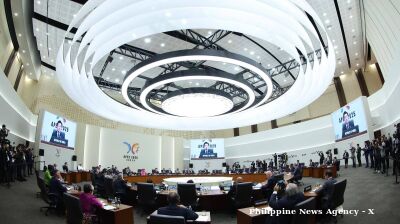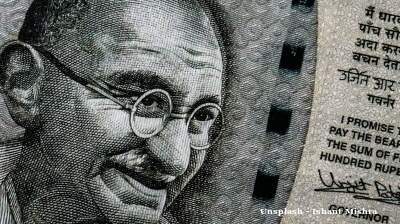Indian Prime Minister Narendra Modi made a historic visit to Poland on August 22 during which he met Prime Minister Donald Tusk and President Andrzej Duda and reached an agreement to upgrade the two countries’ bilateral relationship to a ‘strategic partnership’.
Modi is continuing his tour to Kyiv on August 23 – the first by an Indian premier since Ukraine became independent – where he will meet President Volodomyr Zelinskiy and “share perspectives” on how to end Ukraine’s war with Russia.
The Indian premier’s tour highlights India’s growing international clout, marking the first visit by an Indian prime minister to Poland in 45 years, while also representing Modi’s most important intervention thus far in the Ukraine war.
It is widely regarded as an attempt by Modi to take a more balanced attitude towards the conflict. Modi was strongly criticised by the US and Ukraine for his visit to Moscow last month, which coincided with a Russian missile attack on a children's hospital in Kyiv.
“It is a huge disappointment and a devastating blow to peace efforts to see the leader of the world’s largest democracy hug the world’s most bloody criminal in Moscow on such a day,” Zelenskiy had said on social media site X.
India has remained neutral on the conflict, criticising both the war but also sanctions on Russia, its longstanding ally, and avoiding direct criticism of Moscow for starting the war and its atrocities against civilians. India has also benefited from discounted Russian crude oil during the war, which have also helped sustain the Russian economy.
Modi is following an increasingly popular multivector foreign policy that tries to build closer ties with the international community as its economy rapidly develops, but at the same time avoids being dragged into the East-West clash.
That is demonstrated by the twin Moscow, Kyiv trips, but it also has been seen in Modi’s attempts to tone down the decades-old tension between Delhi and Beijing. In this context, India’s membership in the BRICS club has been useful, but at the same time Modi has also built up India’s leading role in the G20 and dominated last year’s summit, which was not attended by either Russia or China at head of state level. Now Modi is positioning India as a peacemaker in the Ukraine conflict.
"India firmly believes that no issue can be solved on a battlefield," Modi told a press conference during his visit to Poland. "We support dialogue and diplomacy for the quick restoration of peace.”
In his remarks, Tusk supported India’s potential role, even though Poland has been one of neighbouring Ukraine’s strongest and most hardline supporters.
“We believe that your visit to Ukraine will be historic,” Tusk said. “I am very glad that the prime minister has confirmed his readiness to personally engage in bringing about a peaceful, just and speedy end to the war,” he added.
India is but the latest in a series of countries from the Global South that have fancied a role as a potential mediator in the Ukraine war, with efforts by Turkey, China and Brazil demonstrating their growing global clout and their balanced position between the West and Russia.
Modi’s visit also demonstrates Poland’s growing importance in Europe since the inward looking radical right-wing Law and Justice government was succeeded by Tusk’s centre-right coalition in December.
Ahead of his visit, Modi said Poland was India's key economic partner in Central Europe, and during their meeting Modi and Tusk discussed upgrading the two countries’ bilateral relationship to a ‘strategic partnership’.
Afterwards Modi said on X: “This visit gave an opportunity to deepen cooperation with a valued friend. We look forward to closer business and cultural connect with Poland.”
According to the Indian embassy, the total value of bilateral trade has increased from $1.95bn to $5.72bn, most of which is Indian exports.
One promising field for cooperation is defence, with India trying to modernise its armed forces and diversify away from its mainly Russian purchases up to now, and also build up its own exports; at the same time, Poland is ramping up defence spending and also trying to boost its own arms industry.
"It is no coincidence that we talked about intensification in terms of the defence industry," Tusk told the news conference. "We are ready as Poland to take part in the modernisation of military equipment.”
A Polish official told Reuters that one potential defence area was the refurbishing of India’s Soviet-era equipment such as T-72 tanks.
During the visit, an agreement was also signed to ease the movement of specialised workers between the two countries. Indians are increasingly moving to Central Europe for work, and now represent the fourth largest group of foreign workers in the Polish social security system.
News

US–China soybean sales restart
According to Scott Bessent, US Treasury Secretary, the agreement marks a significant step towards restoring normalcy for American farmers.

Russia faces $50bn annual losses from oil sanctions as Lukoil exits international assets
Russia is expected to lose at least $50bn annually due to oil-related sanctions, as Moscow’s largest private oil producer Lukoil agrees to sell its international assets and Germany considers nationalising operations owned by state-run Rosneft.

Chicken and chips in Seoul - for Nvidia, Samsung and Hyundai
In a low-key fried chicken shop in southern Seoul, the leaders of Nvidia, Samsung Electronics and Hyundai Motor held an informal meeting on the evening of October 30.

Presidents Lee and Xi begin diplomatic chapter at APEC summit
President Lee, who is chairing the first session of the summit at the Hwabaek International Convention Centre, stood at the entrance to personally welcome participants. President Xi reached the venue at approximately 10:02.




